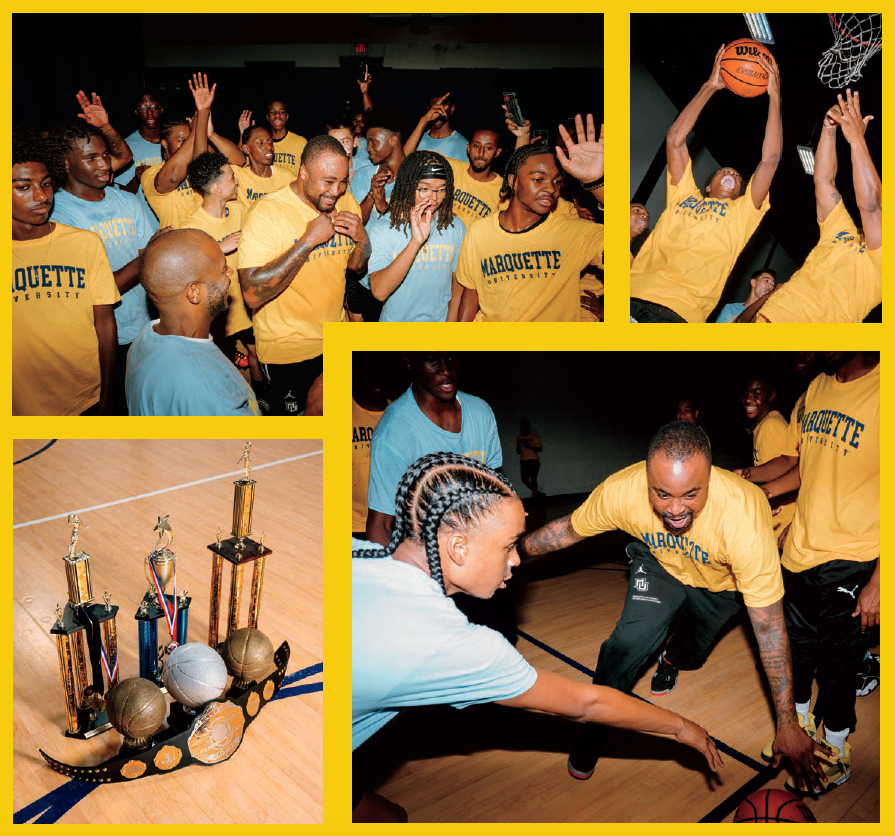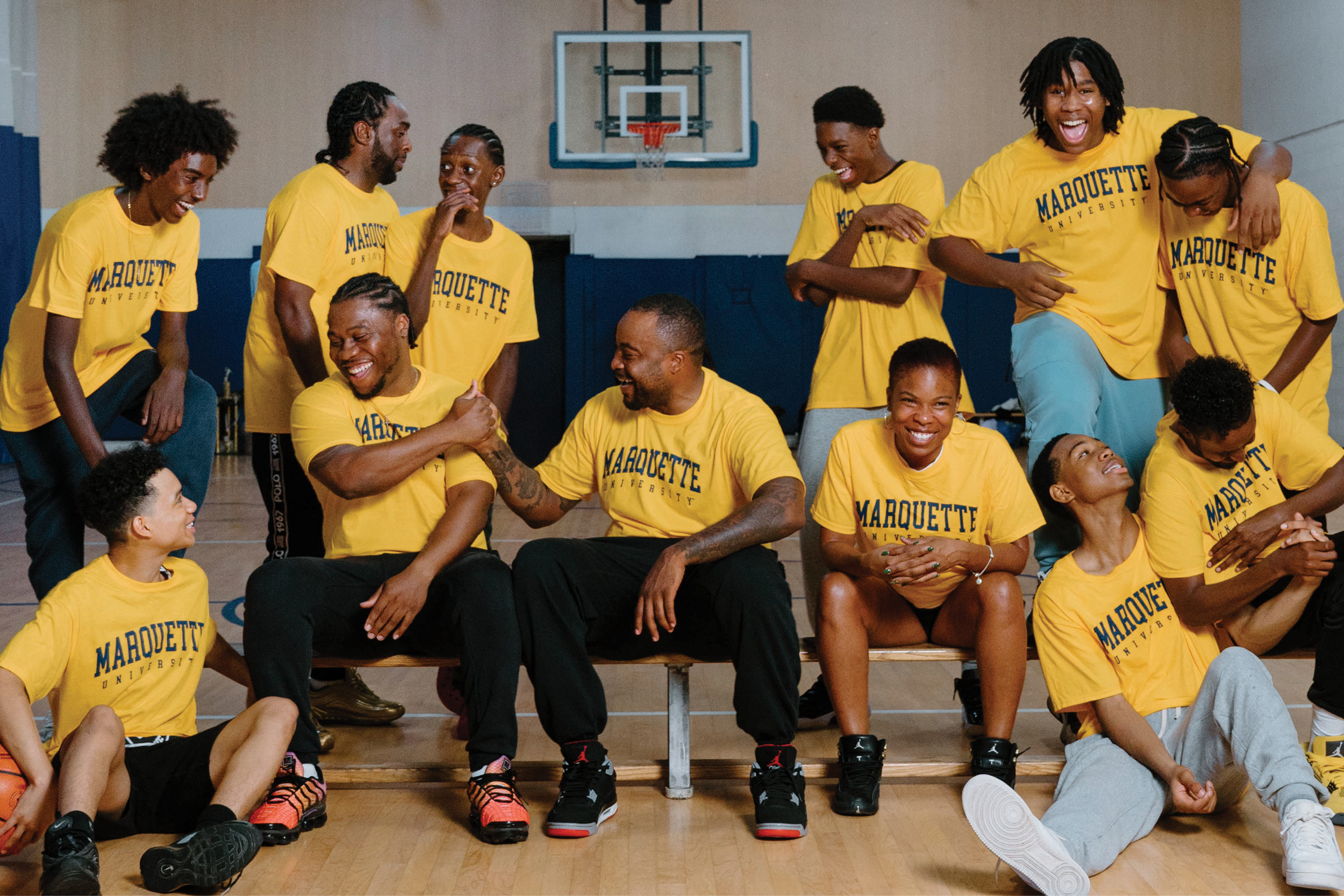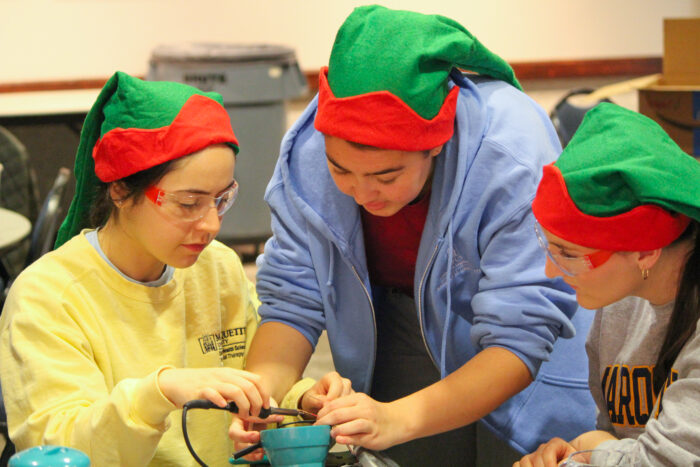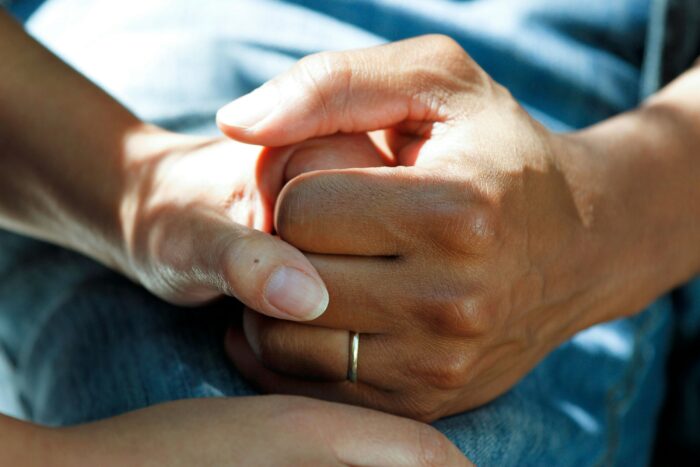As its founder long envisioned it, the Cadougan Elite program is part basketball team, part mentoring program. Mirroring what the former Golden Eagles point guard (center) experienced at Marquette, belief in each other and care for the whole person are foundations for growth and results.
Photos by Stef & Ethan
Imagine an international road trip, driving all night with a dozen ninth graders, from Toronto to Milwaukee — music on repeat, beats up loud, laughter and nonsense and lots of gummy snacks. Sound appealing? It’s not for everyone, but to Marquette basketball alumnus Junior Cadougan, Arts ’13, it was a dream come true.
Cadougan quietly insisted as far back as his Marquette days that one day he would “give back.” He kept returning to his idea of combining a mentoring program with a basketball team, finally launching that program, Cadougan Elite, in 2021. Late last November, he brought the team to visit his college campus. For him, it was his first time back since graduating with his degree in social work and justice nearly a decade earlier. For his team, it was the first time most of them had been out of Toronto, and certainly their first time out of Canada. When asked, “Why this trip?” Cadougan did not miss a beat. “I have never stopped thinking about Marquette, never stopped talking about Marquette. I wanted to come back with my ideas made into a reality. I wanted to show this team what is possible.”
Cadougan grew up in the Jane and Finch neighborhood in Toronto. Built at the northwest end of Toronto, the Jane-Finch corridor became isolated from the rest of the city. Lacking social services and recreational resources, the residents packed into low-income high-rise housing and endured rising crime rates and gang activity. Cadougan himself was a victim, as a drive-by shooting sprayed bullets at a family gathering at their housing complex in 2005. He was struck in the shoulder; his 4-year-old brother was hit by four bullets. Weeks later, Cadougan left for a prep school in the United States to focus on basketball. He struggled with loneliness and being away from his little brother, who was still recovering from the shooting. Basketball, he found, was a way to build a different story for himself.
Basketball brought Cadougan to Marquette. “They wanted me,” he says, “even though I was quiet and small, and not flashy.” He arrived days before school started; all the other incoming guys had been at Marquette all summer. “They knew how to read the lift sheets for workouts, knew their way around campus. It was overwhelming and I was too shy to ask,” he remembers. It took time. Then, as he was finally feeling part of the program, the young point guard faced a huge setback with an Achilles injury. “Ernest (the athletic trainer) worked so hard with me to get me back,” he recalls. He gave up redshirt status to play the last few weeks of the season. “I don’t think I played 60 minutes total my first season, but I was happy to be on the floor.” He believed that Marquette believed in him, and that was all he needed.
That message still resonates today. After an all-night drive, Cadougan pulled up to the Al McGuire Center, where he’d trained hard in so many practices. “We are going to see the people who believed in me,” he told his team. He somehow got the whole team upstairs silently, to surprise the academic staff there. A tearful reunion ensued with Dr. Adrienne Ridgeway, the executive associate athletic director in charge of academic services and programs, and then with Meryl Franke, program director for athletics specialized learning services. The team headed off to breakfast, but Cadougan stayed to catch up. He shared that he was in touch with his former theology and philosophy tutor, Mary Rose. “She just had a baby!” he enthused. “We chat on Instagram. I asked if she remembered me, and she was astounded that I remembered her. I had to tell her, ‘Nobody ever was talking philosophy on Jane and Finch. I learned that from you!’”

Philosophy basics became the foundations for his ideas of how to give back. How can small acts impact a community? How can incremental change create a shift? How can one man mentor many? What Cadougan knew best was basketball, and hard work. After Marquette, he played professionally in Canada and represented his country in international competition. With that credibility-building experience, he began putting his plan into motion. Partnering with a teacher friend, he secured gym space at two different schools and launched an Amateur Athletic Union program in conjunction with the Toronto nonprofit Teach and Ball. Combining sport, education and mentorship with a message of empowering youth, Teach and Ball exactly aligned with Cadougan’s values. He’s seen programs where coaches care more about making money than about developing kids. “My pockets are not lined with anything,” he says, pulling his pockets inside-out. “We charge one-half or one-third of other programs, and make it work. Nobody is getting rich over here.”
The program cost is just a fraction of the story. The teens in Cadougan Elite — currently one team in the under-15 age group — are from rival neighborhoods. “From neighborhoods that shoot at each other. They are rejects from other AAU programs; they didn’t make the cut,” Cadougan says, pausing. “You know what? We are beating those teams that cut them. They are doing that. It’s happening.”
But the program is not just about winning. Cadougan Elite brings in speakers on leadership. The team members check on one another across their neighborhoods. Cadougan talks about the doors basketball opened for him: “Without basketball, I would have run with the wrong friends and made far different choices.” Bad choices abound in Jane and Finch, yet he sees potential for each kid willing to work. “Maybe basketball isn’t their ticket to what is next, but working hard, building something — that is good learning.” Sharing with them the story of the 2005 shooting and of his own father’s slaying, which happened while he was at Marquette, he connects with his team on levels far beyond being a coach drawing up plays on whiteboards.
On their first night in their Milwaukee Airbnb, Cadougan could not sleep. He flipped on some basketball on late-night TV. Behind him, he heard one of his players. “Can’t sleep,” said the teen.
“Come watch,” invited Cadougan.
“With you?” asked the boy.
“Yes, with me — we are just guys liking a game right now.” Recalling that story, Cadougan said it was such a little thing, but so many of these kids do not have a strong male figure in their lives, just to hang out with and watch a game, to critique plays and give commentary on who has a better shot.
“It’s not about winning, it’s about sharing this time,” he says, “I don’t take that for granted.” Reflecting on what surprises him most about this work, Cadougan says: “It’s the love. Love from everywhere. I’ll be in the grocery and someone will say, ‘I see what you are doing; it’s so good.’ Or people will just thank me for starting this program, they tell me it’s so needed.”
If you are looking for someone to believe in, believe in Junior Cadougan, who drove all night to show a group of ninth graders what is possible beyond what they can imagine.
Cadougan says he’s profoundly grateful for his time at Marquette, and where it’s led him in his career. He still recalls being recognized at his Senior Night game, the sole senior on a team that was about to make it to the Elite Eight of the 2013 NCAA Tournament. “I was proud to represent. I’m still proud to represent. I never stop thinking of Marquette.” As philosophy studies got him thinking about giving back, his social work and justice courses helped him understand issues of access and marginalization, and how difficult it is to break stigmas and build opportunity. For years, he nurtured his idea for reversing that cycle until it became a reality, one rooted in the Jesuit ideal of caring for the whole person, he recognizes.
When asked about his inspiration, he does not hesitate. “My mother. She has always inspired me. She worked shifts at a factory so I could play basketball. I work hard because I learned from her. She believed I could make a difference at Marquette. Now I think I can make a difference because of Marquette. It’s full circle.”
Maybe you were at the game last November where Marquette upset sixth-ranked Baylor, an early sign that an overlooked team was headed for much bigger things. If so, you saw the game the Cadougan Elite team saw, and maybe you, too, believed anything is possible.
A lot has happened since that visit — for Marquette basketball, certainly, but also for Cadougan’s partnership with Teach and Ball. This summer, Cadougan Elite went undefeated in winning the highly competitive Canadian National Invitational Tournament. And Teach and Ball has established mentors for the boys on the team and launched Mothers in Action, through which mothers of participants of all league teams can connect with mental health and wellness providers to help them guide their sons on and off the court. You can believe Junior Cadougan established that initiative in honor of his own mother, Suzette, who gave to him so he could give to others.
From Toronto to Marquette and back, that circle is the key.




